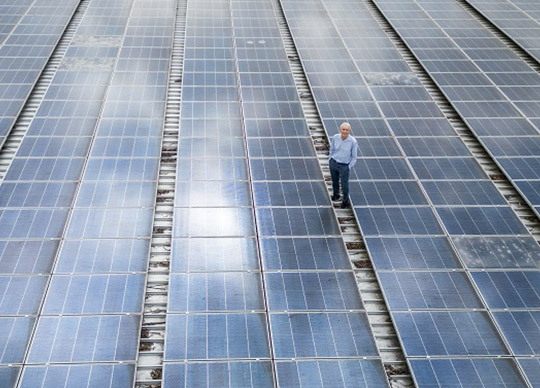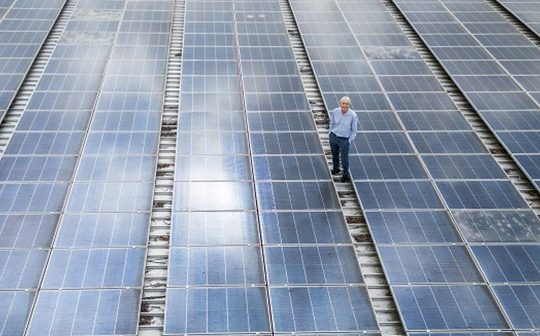
An internationally renowned expert in solar energy from The Australian National University (ANU) who helped transform the efficiency of solar cell technology has been honoured with the world’s most prestigious engineering prize.
Professor Andrew Blakers from the ANU College of Engineering, Computing and Cybernetics, his former PhD supervisor Professor Martin Green from UNSW Sydney, Dr Aihua Wang and Dr Jianhua Zhao have been awarded the 2023 Queen Elizabeth Prize for Engineering (QEPrize) for development of Passivated Emitter and Rear Cell (PERC) solar photovoltaic technology.
PERC technology is easy to manufacture and can produce more electricity compared to other solar technologies. After decades of improvements and input from many scientists and companies, PERC is now the most commercially viable silicon solar cell technology used in solar panels and accounts for about 90 per cent of the world’s solar cell market, making it the global standard.
“This is such an honour for me, and a testament to the many wonderful people I have worked with over the years. As a PhD student and postdoctoral researcher working on high efficiency silicon solar cells at UNSW in the 1980s, it was a fantasy to imagine that our work could have a global impact,” Professor Blakers said.
“I am delighted to share this prize with Professor Green, Dr Wang and Dr Zhao who have made major contributions to solar energy over many decades.”
Fast forward four decades and PERC solar cells have underpinned exponential growth in high performance, low-cost solar electricity adopted right around the world. The technology currently plays a key role in decarbonizing energy grids in Australia and globally.
The solar research lab at UNSW held the global record for silicon solar cell efficiency for most of the period from 1983 to 2014. In the 1990s, Professor Green’s lab achieved a 25 per cent efficiency target — with Dr Wang and Dr Zhao leading the work – which remained the world record until 2014.
The 2023 Laureates greatly improved the energy conversion efficiency of commercial solar cells on the market by improving the quality of both the top and the rear surface of standard silicon cells. PERC introduced an additional layer on the back surface that helped reflect unused photons back into the silicon to generate more electrons, leading to greater energy efficiency.
Through their work on PERC technology, and with the input of many others worldwide, the 2023 awardees have significantly reduced the costs of solar panels, with the cost of solar power generation falling by more than 80 per cent in the last decade – making solar the cheapest source of electricity in most countries.
Professor Blakers hopes to use his newfound platform as a QEPrize recipient to highlight the importance of accelerated solar adoption to address the threat of global warming.
“Solar energy is enormously abundant nearly everywhere. Silicon solar cells allow clean and affordable electrification of energy-poor rural areas across Asia, Africa and the Americas. This energy source creates large opportunities for billions of people to improve their economic, educational and social positions without the destruction caused by fossil fuels,” he said.
“On current growth rates, silicon solar cells will have more installed power generation capacity in 2031 than coal, gas, nuclear and hydro combined.”
Australia generates about twice as much solar energy per person compared to any other country. Together, solar and wind are rapidly displacing coal and gas from the national electricity grid.
“Silicon solar cells provide the cheapest energy source in history. Universal access to very cheap and abundant solar and wind energy allows the elimination of fossil fuels, resulting in an 80 per cent reduction in global greenhouse emissions,” Professor Blakers said.
“Storage to support solar and wind energy is a solved problem in the form of pumped hydro and batteries.”
In a career spanning more than four decades, Professor Blakers has dedicated his time and effort to developing solutions that help address climate change and accelerate Australia and the world’s transition to 100 per cent renewables.
Professor Green said: “I am honoured to share this esteemed award with Andrew. As engineers we are constantly striving to improve the world we live in.”
“As the world feels the devastating impacts of our changing environment and collapsing ecosystems, I feel passionately that we must rapidly reduce our reliance on fossil fuels if we wish to maintain the trajectory of human civilization on our shared planet.”
Professor Blakers said he hopes to inspire the next generation of engineers who are equipped with the creativity, curiosity and drive required to tackle some of society’s biggest challenges, such as climate change.
“We have all the technology needed to eliminate fossil fuel use by 2040, and reduce 80 per cent of global greenhouse emissions, so let’s get on with it,” he said.
The QEPrize is awarded every year and recognises engineers from across the world who have delivered innovative solutions to some of humanity’s greatest challenges. As recipients of the award, the 2023 Laureates join a cohort of engineers who have radically changed the world we live in, cementing their place alongside the likes of Sir Tim Berners-Lee, the inventor of the World Wide Web.
They will receive their award at a ceremony in London later this year. To learn more about the award, visit the QEPrize website.






